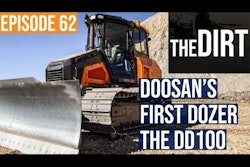It’s no secret the construction industry has a labor shortage. And the big question is, what can be done to fix it?
In this episode of The Dirt, host Bryan Furnace makes an impassioned plea for contractors to get involved in helping to solve the problem. He also offers a potential solution that could pay off for contractors willing to take the initiative.
For those waiting for someone else to fix the problem, they’re going to be out of luck. It’s an industry-wide challenge that everyone in the industry will need to be involved in to help fix.
Furnace’s call to action is a timely one.
The nation’s unemployment rate has fallen to 3.5%, the lowest it’s been since the 1960s. That means most industries are hunting for workers, putting even more pressure on construction’s labor shortage.
The industry added 32,000 jobs in July. Of those, 18,300 were hired for nonresidential construction, and 14,100 were hired for residential jobs. But that’s still a far cry from the 330,000 positions left to fill, which is the second-highest worker deficit in 22 years.
All of that means it will be even more difficult for contractors to grow as they also face inflation and rising interest rates.
So if you’re tired of construction’s chronic labor shortage and want to know what you can do about it, check out the latest episode of The Dirt.
Equipment World serves up weekly videos on the latest in construction equipment, work trucks and pickup trucks – everything contractors need to get their work done. Subscribe and visit us at equipmentworld.com!
In this episode:
00:00 Intro to solving the labor issue in construction
01:07 Who will fix the skilled trades labor shortage?
02:14 How can contractors help?
04:44 How can your business get involved?
06:18 Taking back the narrative around the skilled trades
Hi, everyone. Welcome back to Equipment World. You're watching The Dirt. I'm your host, Bryan. And today I want to beat a dead horse. I want to talk about the labor force issue, but we're going to come at it from a totally different angle and I'm probably going to ruffle some feathers. We love to talk about the labor force shortage. Everyone in this industry loves to talk about the labor force shortage because we are all suffering from the labor force shortage. But my big problem with the way that conversation goes right now is everyone says someone needs to do something about this labor force shortage. And everyone in agreement says, yes, someone needs to do something about the labor force shortage, but no one actually does anything about the labor force shortage.
We all just sit in a big group and we have a conversation about how everyone's having issues, but there's not a whole lot of action on those issues. And that's my problem. We are all collectively waiting for someone to fix the problem for us. And unfortunately, that fix is not coming anytime soon. If we're looking to the public education system to somehow magically change and not push higher education, you're going to be waiting a very, very, very long time for that change to happen. If you think the federal government's going to step in and magically pass some bills that will, poof, make this problem disappear. I have bad news for you. That's not coming anytime soon. If we're waiting for associations to take over the problem, right? Because they've got resources, they can pour into this labor force shortage issue. How many associations are there? And out of all of the things that they have their own hands in, how much money are they going to divert to solving this problem? I'm sorry, guys, that's still not going to solve the problem.
What about YouTubers? YouTubers are doing a fine job of getting the word out about the industry. Again, this is not a change that's going to happen overnight and YouTubers can't reach all of the possible people that need to hear the message about the skilled trades. So where am I going with all of this, where I'm going is I'm putting the onus on you. You the contractor, you also need to get involved in this and I don't want to single you out because it's not just contractors. It is everyone involved in the skilled trades across the board. That's manufacturers, that's dealerships, that's contractors, that's individuals who just are passionate about the trades. We all have to start rowing collectively in the same direction or this problem will never get fixed. Sitting around and having this conversation isn't actually doing anything to solve the problem.
We're workers. We are the skilled trades. We pride ourself on our ability to get in there and get our hands dirty. And yet this is a conversation where no one's really willing to go get their hands dirty because well, that's going to cost me time and it's going to cost me money. I'm going to have to take resources out of my own personal business to go do something. But that's what we pride ourselves on. Isn't it? Doing something? That's why we got into the skilled trades is because we see a problem and we go fix the problem. We don't pass it off to someone else. This is one of those times where we have to get in. We have to get our hands dirty and roll up our sleeves and we have to go fix this problem, all of us together.
So what are some ways as a business, as a company that you can get involved? Well, I'm going to tell you right now. You remember auto shop and all of those carpenter classes you might have enjoyed when you were coming through school. Most schools don't have those anymore. They've all gone away. Could you possibly approach the school board and talk about reinstating and possibly helping to fund the reinstatement of some of those programs? Let's revive the skilled trades in middle school and high school. When these kids are actively making decisions upon what career path they want to embark upon, if we can catch them early, we have a chance of bringing them into this industry and showing them without the bias of the white collar industry chiming in that this is a really great career path.
Could you potentially invest in some of these programs? There's career days, all the time at schools and you know who's there? Colleges, all of them. They are very involved because they recognize the importance of getting in front of those students so that they will come to their school. What are you doing as a contractor to get some of those individuals to maybe look at the skilled trades, specifically your company, as a possible career path after high school? Are you involved at all? Are we having any of those conversations with these kids? More than likely the answer is no, because again, we as an industry are all sitting around waiting for someone else to take the ball and run with it. But this is an all hands on deck situation. Everyone, everyone needs to be involved in these conversations. Everyone needs to be thinking about how we can get in front of these students and how we can take back the narrative around the skilled trades.
Because for the last 50 years, we know what the narrative has been. We're in this industry. Don't be that guy on the side of the road, see kids, that's why you stay in school. That's someone else writing the narrative for us. We have to collectively take the narrative back and talk about why the skilled trades is a great career path and why these kids should consider coming into the skilled trades as opposed to going to school. So that's what I've got for you today. I really want you to evaluate what you as a company are doing to help solve this problem, because it's only going to get fixed if we all work together. This is bigger than you and your competitor. This is bigger than the excavating industry. This is a nationwide workforce problem that we all collectively have to solve together. And yes, that means individually as companies, we will have to pour some time and resources into solving this problem.
But think about it this way. It's not just a deep dark hole you're throwing your money and time into. This is an investment into your future workforce. If this were any other problem, take the labor out of it. If this were any other problem within your business, that was substantial enough that it's going to cause you real issues down the road of either shrinking as a company or having to go out of business, without hesitation, we would all pour money into and resources into solving that problem. Wouldn't we? How is this different? You're investing in your future as a company by investing in these kids and getting the message out there. So that's what I've got. I hope this has been helpful. If nothing else, I hope this makes you take pause and think about how you can get involved personally into solving this issue. So thanks for watching and we'll catch you guys next time on The Dirt.









